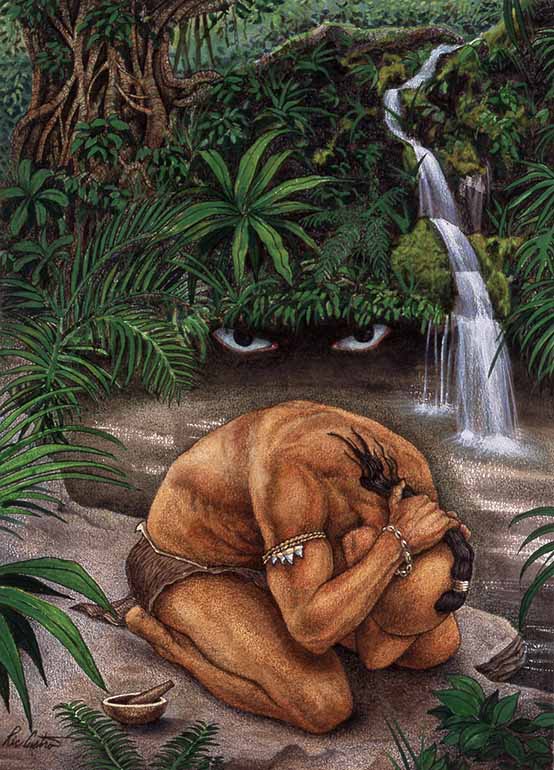Aniti: Spirit

Spirits
Aniti is the ancient CHamoru word which meant spirit. In its contemporary use, it has evolved to mean evil spirit or demon though some people are using it again to mean spirit.
In various historical documents the term aniti is used to describe the spirit of the deceased person, while in other documents it is used to reference maleficent (harmful) effects on a person. However, the collective use of the word addresses the worldview of the ancient CHamoru. In this cosmological view, the aniti is a force which also finds its way into the everyday lives of the ancient CHamoru. In some instances, the taotaomo’na (people of the land) are also considered to be evil spirits who taunt and harm innocent people or those who show disrespect in one manner or another. Hence the term encapsulates both types of spirits and both having influence over the lives of both the ancient and modern day CHamorus.
In ancient CHamoru society, the term aniti referred to soul or spirit. The all-encompassing Christian evangelization efforts by Spanish missionaries that began in the late 17th century polarized the meaning of aniti, to refer to something evil.
Aniti changed to mananiti, or the devil. This was a result of a quick introduction of a new religious system known as Catholicism.
Today, aniti is notorious for bad luck or misfortune befalling someone who is deemed as disrespecting the ancestors. Interestingly, the term aniti and taotaomo’na are synonymous to each other yet it is treated differently by way of worldview.
For further reading
Cunningham, Lawrence J. Ancient Chamorro Society. Honolulu: Bess Press, 1992.
Ibañez y Garcia, Luis de. The History of the Marianas, with Navigational Data, and of the Caroline and Palau Islands: From the Time of their Discovery by Magellan in 1521 to the Present. Translated and annotated by Marjorie G. Driver. MARC Educational Series no. 12. Mangilao: Micronesian Area Research Center, University of Guam, 1992.
Le Gobien, Charles. Histoire des Isles Marianes, nouvellement converties à la Religion Chrétienne; & de la mort glorieuse des premiers Missionnaires qui y ont prêché la Foy (History of the Mariana Islands, newly converted to the Christian religion: and of the martyrdom of the first missionaries who preached the Faith there). Paris: Nicolas Pépin, 1701.
Rodriguez, Fred T. “The Humble Man of God: One Man’s Communion with God and Creation.” MA thesis, Dominican School of Philosophy and Theology, 2004.